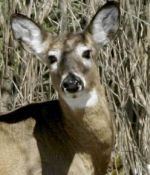
The Department of Fish and Wildlife is the steward of Vermont’s natural
surroundings, charged with protecting wildlife, fish, plants and their
habitats. The primary funding source for this work is the annual license
fees paid for hunting and fishing, a system that dates back decades to
when it was the Department of Fish and Game. But hunting
and fishing are on the decline and the Department’s increased workload has benefits outside the
sporting community, a situation that has called into question how the department is
funded. We talk Commissioner Wayne LaRouche, former commissioner Steve Wright,
and with Ed Gallo of the Vermont Hunters Anglers and Trappers Association.
(Listen)
Also in the program, traffic jams in the Upper Valley. Reporter John
Gregg talks to us about how snarls of traffic are affecting the greater
Lebanon area and some possible solutions. (Listen)
And essayist Tim Johnson
commiserates with all of those who have been afflicted with this
season’s flu. (Listen)
Comments from listeners on Fish and Wildlife funding:
James Ehlers, co-chair of Legislature’s Funding Study Task Force:
The General Fund provides the funding necessary to balance the F&W budget, while at the same time providing accountability to the Legislature and the taxpayers on how that money is spent. A dedicated tax does not. There is no funding problem. The problem is one of competing interests seeking access to increased government funds for their own agendas, like climate change and land acquisition, without having to debate the merits of such programs before the Legislature. If more money is needed for wardens, the Legislature could be approached for this.
Sherb Lang, president of H.A.T.:
Does Steve Wright believe that we should repair our basic infrastructure before creating any more programs or positions in F&W? Does he believe that our fishing access areas should be repaired, our Game Warden force fully staffed? The reason F&W has money woes is because of more staff than there was in 1983. The current budget problem is not all about declining hunting license fees. Let’s be honest with each other.
Paul from Bridport:
Is there a broader way we should be looking at this issue? We all owe F&W more than we understand. It provides a critical service managing and preserving and enhancing our environment. It has value to education, recreation (therefore, health care) and tourism to mention just a few.
Michelle from Worcester:
I think it is important not to make the assumption that kayak’s do not contribute to fish and wildlife. My husband, daughter and I all kayak and use the fishing accesses and we all have full hunting and fishing license’s with many additional tags.
Sarita in St. Johnsbury:
To the best of my knowledge, currently tour operators cannot offer kayak or canoe trips using fish and wildlife access points as the argument is that it is paid by fishing and hunting licenses. Why can’t this be expanded so that people can have a water use license for individuals as well as organized businesses?